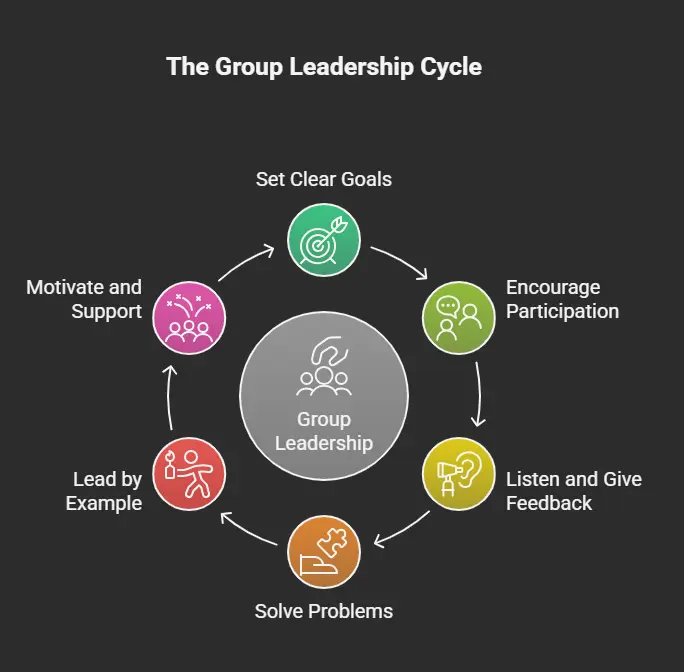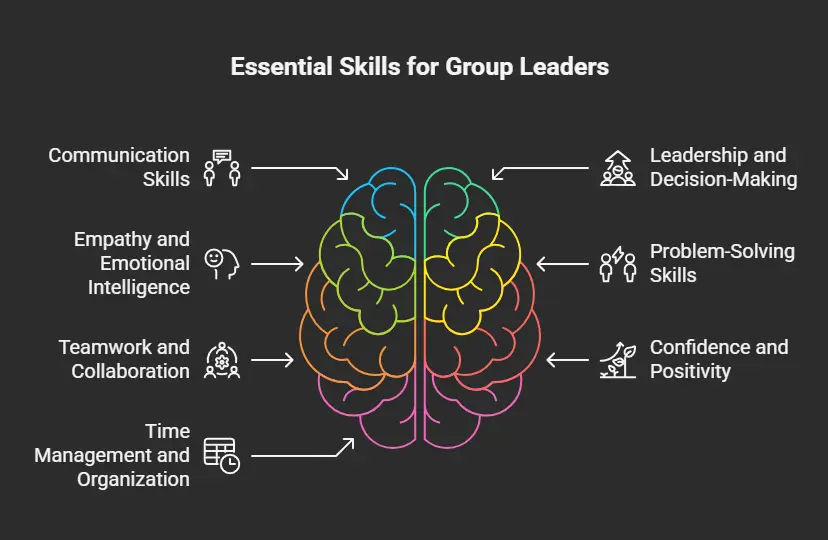Table of Contents
In the journey of personality development, one of the leading roles is that of a group leader. Whether in the classroom, workplace, or self-development circle, a group leader plays an important role in guiding individuals towards personal and collective development. They are not just organizers or supervisors-they are motivators, role models and incentive for change. Through their leadership, group members gain trust, improve communication, increase emotional understanding and develop essential interpersonal skills. In this blog, we will explore the most important responsibilities of the group leader in personality development, and their influence can help individuals become more self-aware, self-confident and effective.
Begin Your Personality Transformation- Enroll Today!
Introduction
A group leader in the category of personality development is one who guides, supports and inspires a group of individuals to improve his personal and mutual skills. These leaders play an important role in helping people become more confident, self -conscious and effective in their communication and behavior.
By creating a safe and encouraging environment, group leaders foster collaboration and mutual respect among members. They help individuals identify their strengths and areas for improvement, encouraging honest reflection and continuous learning. Their ability to mediate conflicts, offer constructive feedback, and celebrate progress makes them a cornerstone of any successful development program. A strong group leader not only influences the group’s overall dynamics but also leaves a lasting impact on each member’s personal growth journey.
Role in Personality Development
In personality development programs, a group leader plays a crucial role by guiding and facilitating group activities, discussions, workshops, or training sessions. Their responsibilities often focus on areas such as building self-confidence, enhancing communication skills, developing emotional intelligence, promoting teamwork, and encouraging personal growth. Through their leadership, participants gain valuable insights, practice new behaviors, and gradually transform into more self-assured and socially aware individuals.
-
Self-confidence
-
Public speaking
-
Body language
-
Leadership skills
-
Positive attitude
-
Goal setting
-
Teamwork and cooperation
-
Emotional intelligence
What does a Group Leader do?
A group leader may be more than just that, contributing positively or negatively to the personal growth of other group members. Their primary job is to establish a community of encouragement and uplifting experiences where everyone can share and gain personal benefits .
1. Sets Clear Goals
A group leader helps the group understand which side they work. Whether he creates confidence, improves communication or develops teamwork, sets the leader a clear goal and keeps everyone focused. This gives the group a sense of direction and purpose.
Clear goals also allow for measurable progress, giving group members a tangible sense of achievement. When people see how far they’ve come, they are more motivated to stay committed. A strong leader revisits these goals regularly, adjusting them as needed to suit the evolving needs of the group.
2. Encourages Participation
One of the lead roles to the leader is to ensure that everyone gets a chance to talk and share ideas. They make a safe place where members feel comfortable expressing themselves. It creates confidence and helps people improve communication and social skills.
By promoting inclusive participation, leaders also help quieter or more reserved members step forward and find their voice. This creates a more balanced and dynamic group where everyone’s input is valued, ultimately leading to better collaboration and mutual growth.
3. Listens and Gives Feedback
A good leader is listening carefully to a member of each group. They provide helpful feedback in a kind and respectful way. It helps everyone to understand what they are doing well and what they can improve, which is important for personal development.
The leader of a group should listen to each team member. They provide help in a kind and respectful manner. This prompts everyone to understand what they are doing right or wrong, and what they can improve, which is important for personal development. Constructive feedback also encourages self-reflection, allowing individuals to take ownership of their development. A leader who actively listens shows that they respect each member’s perspective, which builds trust and encourages open communication within the group.
4. Solves Problems and Handles Conflicts
At times in a group, there may be disagreements or misunderstandings. Strong leaders stay calm and solve problems effectively . They work with the group to find solutions that maintain a respectful, positive environment.
In resolving conflicts, a good leader remains neutral and considers every viewpoint before guiding the group toward resolution. Their ability to mediate with fairness prevents issues from escalating, which maintains group harmony and fosters emotional maturity among members.
5. Leads by Example
A group leader inspires others through their own behavior. If the leader is confident, kind and respectable, the group members are more likely to work in the same way. It helps to create good habits and strong character in everything.
By consistently displaying integrity, responsibility, and empathy, the leader becomes a living model of the values they aim to cultivate in the group. This authenticity builds credibility and encourages members to internalize and practice similar behaviors in their personal lives.
6. Motivates and Supports
Finally, a group leader holds the group motivated. They encourage members in difficult times and celebrate their progress. This support helps each person to be obliged to personal development.
Beyond encouragement, a great leader also recognizes individual strengths and helps members set personal goals. Their support acts as a source of accountability, helping individuals stay focused and driven even when challenges arise.
Where does a group leader work?
A group leader can work in many different places, depending on the type of group they lead. Their main goal is to help others grow, learn and collaborate, so that they exist in an environment that supports learning, teamwork or personal development. Below are some common places where group leaders work:
1. Schools and Colleges
In educational environments, group leaders often guide student groups, clubs or project groups. They can be teachers, older students or appointed leaders. Their role is to help students collaborate, share knowledge and develop communication and leadership skills. They also help resolve conflicts and ensure that everyone participates equally.
2. Corporate and Office Settings
In the workplace, group leaders often lead teams or departments. Their job is to assign the tasks, monitor progress and ensure that everyone works well together. In these environments, group leaders help to grow professionally by creating teamwork, problem solving and decision -making skills. They also provide support, response and encouragement to improve performance.
3. Workshops and Training Programs
Group leaders are often found in personality development workshops, leadership training or skill -giving sessions. In these settings, the participants guide through activities, discussions and exercises. Their goal is to help people improve their self -awareness, self -confidence and communication. They ensure that the environment is positive and useful for everyone.
4. Community Centers and Social Groups
In a social or social environment, group leaders can lead young groups, volunteers or local clubs. These leaders help to bring people together, plan activities and encourage personal and social development. They promote teamwork, responsibilities and leadership in more informal surroundings.
5. Online Platforms and Virtual Groups
With the emergence of technology, many group leaders are now working online. They lead virtual groups through video calls, chat groups or learning platforms. These online leaders help direct discussions, share resources and keep the group active and concentrated, even when members are in different places.
6. Health and Wellness Centers
Group leaders also work in places such as counseling centers, support groups or training programs. They guide group sessions that focus on emotional, mental or physical welfare. Their job is to support individuals by promoting healthy and positive group dynamics.
Skills for a Group Leader
A group leader requires a special set of skills to guide, support and motivate others. These skills help them manage the group effectively, solve problems and encourage personal development among members. These skills are not only useful in formal group settings but also in daily interactions, making group leaders effective communicators, collaborators, and role models in various environments. Constant learning, self-reflection, and feedback help leaders sharpen these skills over time. The most important skills below are that each group leader must have:
1. Communication Skills
With clear and confidence is one of the most important skills. A group leader should be able to explain ideas, actively hear and respond in a respectable way. Good communication helps avoid misunderstandings and sets the group on the same page.
Additionally, non-verbal communication like body language, tone, and facial expressions plays a vital role in how messages are received. A skilled leader pays attention to these cues to ensure their message is understood and their presence is approachable.
2. Leadership and Decision-Making
A group leader should be able to make responsibility and make decisions when needed. This involves setting goals, assigning tasks and guiding the group through challenges. Strong leadership gives direction to the group and creates confidence. An effective leader also knows when to involve the group in decision-making. Encouraging input from members creates a sense of ownership and collective responsibility, leading to more engaged and committed participants.
3. Empathy and Emotional Intelligence
Understanding how others feel is important for building strong relationships. A good leader shows sympathy, listens without decisions and supports members emotionally. It creates a safe and positive group environment. High emotional intelligence also allows a leader to remain calm under pressure and manage their own emotions effectively. This stability sets an example for group members and fosters an emotionally balanced group culture.
4. Problem-Solving Skills
Problems and conflicts in any group are natural. A skilled leader can quickly identify problems and find the right solution. It helps maintain peace and keep the group going forward. Good problem-solvers also use creative thinking and encourage the group to brainstorm solutions together. This not only builds teamwork but also boosts the group’s ability to handle future challenges more independently.
5. Teamwork and Collaboration
A group leader works with others, not on them. They should encourage teamwork, help everyone feel involved and create a sense of unit. Good cooperation makes the group strong and more productive. By recognizing each member’s contributions and promoting shared goals, a group leader strengthens trust within the team. They also create opportunities for collaboration through group projects and joint decision-making.
6. Confidence and Positivity
Confidence helps a leader to earn respect and make a difficult choice. Positivity keeps the group motivated even in difficult times. A leaders’ attitude greatly affects the group in the group. A confident and positive leader also inspires resilience. When members see the leader remain optimistic during setbacks, they are more likely to adopt the same mindset and stay committed to their personal development.
7. Time Management and Organization
A group leader should wisely control the time. They have to plan meetings, set a time limit and place activities on the track. The good outfit ensures that everything goes well. Strong organizational skills also involve keeping records, following up on action items, and ensuring everyone stays informed. This structure keeps the group efficient and ensures that no important tasks are overlooked.
Average Salary and Job Outlook for a Group Leader
1. Average Salary of a Group Leader
The salary of a group leader depends on work, location and type of experience. In India, as well as converted to INR in global roles, it is mentioned here what wages usually look like:
- In a firm, a group leader usually serves between ₹37,35,000 and ₹58,10,000 per year.
- In schools, or any community centres, wages can be reduced from around ₹24,90,000 to ₹41,50,000 per year.
- In high-demanded areas such as health care, production or technology, experienced groups can earn up to ₹66,40,000 or more per year.
2. Additional Benefits
Many group leaders also receive extra benefits from their employers. These benefits add more value to their overall income and job satisfaction.
-
Health insurance
-
Paid vacation
-
Bonuses based on performance
-
Retirement plans (such as 401(k) in the U.S.)
3. Job Outlook and Demand
The job approach to group leaders is strong. Many companies and organizations are more focused on teamwork, management and personal development. This means that there is a growing need for talented group leaders to guide and manage teams.
Jobs are available in schools, offices, fitness centers, non-profit and even online platforms. Along with the increase in distance work and virtual training, group leaders must also lead online groups and digital workshops.
4. Career Growth
Leaders in a group can grow in their careers by gaining experience and learning new skills. Over time, they can go to high positions as team leader, coach or department head. This is a good career alternative for those who help work with others and succeed with them.
Begin Your Personality Transformation- Enroll Today!
Conclusion
A group leader is very important in personality development. They help people become more confident, talented, and self-conscious. A group leader supports others and guides them to communicate better, work in a team, and believe in themselves. They make a significant difference by encouraging everyone to grow and improve.
The group leaders set a good example and resolve problems peacefully. They create a safe and positive environment where people feel motivated to learn. With skills such as effective communication, empathy, and management, they bring out the best in each individual. Whether in a school, office, or online group, a leader helps everyone move forward and improve as a team and as individuals.
| Related Links | |
| Top Communication Skills For A Resume | Verbal Communication Skills: Examples & How To Improve Them |
Boost Your Skills & Kickstart Your Career!
Employability and Personality Development Course by Entri App: Enhance your communication, confidence, and job-ready skills to excel in your career.
Join Now!Frequently Asked Questions
What is the main role of a group leader in personality development?
A group leader helps guide and support individuals in a group setting to improve their personal and social skills. Their main role is to create a positive environment where members feel comfortable, confident, and motivated to grow. They lead activities, encourage participation, give feedback, and help solve problems. Their goal is to bring out the best in each person.
What skills should a group leader have?
A good group leader should have strong communication skills, empathy, confidence, and the ability to solve problems. They also need to be good at managing time, making decisions, and motivating others. Leadership and teamwork are key, as they need to lead by example and work well with different personalities in the group.
Where do group leaders usually work?
Group leaders can work in many places such as schools, colleges, offices, training centers, community programs, or online platforms. Anywhere people come together to learn, grow, or improve themselves, a group leader can be present to guide the process.
How does a group leader help in personality development?
A group leader helps individuals build confidence, improve communication, and develop better behavior and thinking patterns. They use group activities, role-playing, discussions, and feedback to help members learn about themselves and grow. This support helps people become more aware, responsible, and successful in their personal and professional lives.
Can anyone become a group leader?
Yes, anyone with the right mindset, communication skills, and leadership qualities can become a group leader. Training and experience help, but the most important thing is the ability to connect with people, inspire them, and guide them toward positive change.
What challenges does a group leader face?
Group leaders may face challenges like managing group conflicts, keeping everyone engaged, or handling different opinions. They also need to balance the needs of individuals with the goals of the group. Staying patient, fair, and positive helps them overcome these challenges.













